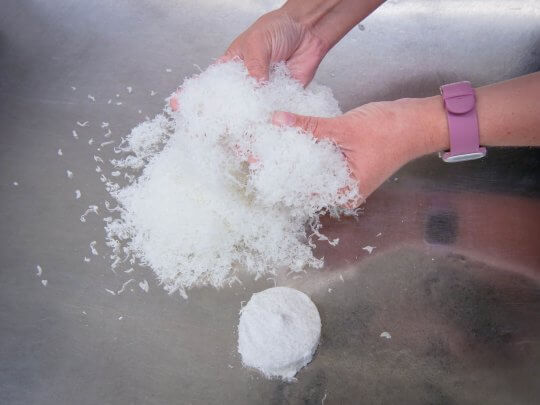The city of Peoria, Illinois, is home to an eyeglass manufacturer with a familiar name—Maui Jim. The brand is renowned worldwide for its fashion-forward approach to sunglasses and prescription eyewear, and it is no wonder that the brand has been so successful.
An ethos of sustainability
The sustainability goals of this brand increase the value of the product to the modern consumer, but the environmental focus of Maui Jim is not surface level. The company has taken steps to implement green practices during production as well as recycling initiatives long after the product has been created and shipped.
Byproducts of manufacturing
The process of creating custom lenses involves a lot of loose, airy scrap and cutting fluid. Each lens starts out as an 11mm thick piece of plastic material that is machined and polished to the correct shape and thickness required for the perfect pair of glasses. The requirements of each order are customized to the end user, and Maui Jim ensures that each lens is cut to perfection.

Swarf generated during the production of lenses is conveyed to the WEIMA briquette press.
“As we start the whole process of making a pair of prescription lenses, they go into what we call an Orbit lens generator. It creates swarf as it cuts that lens down to prescription shape and thickness. That swarf is flushed out with a fluid, used to cool the lens during the cutting process. It is also used as a wetting agent to flush it through the evacuation tubes. That fluid, which is taking the waste out, is cleaned back up and then comes back to the machine for reuse.”
Paul Ponder, VP of RX Manufacturing, Maui Jim
Collaboration was key
Bazell Technologies has worked with Satisloh to provide the best-in-class coolant delivery equipment that Maui Jim uses to generate lenses. The engineers at Bazell worked with WEIMA to select the right briquette press for the job - in this case a “Vario” model - to compress the lens swarf and separate out the cutting fluid for reuse.
The shavings, once they have been separated from the cutting fluid, are then conveyed from the cleaning unit to the WEIMA briquette press. The WEIMA machine sits in its own designated space just off the production floor. Its footprint is minimal, but its presence in the process makes it possible to recycle the fluid and the swarf.
“It takes the processing of the debris off the production floor and saves space. This allows space for more lens generators on the production floor.”
Paul Dick, President and Managing Director, Bazell Technologies
The benefits of briquetting
With 12:1 compaction rates, Maui Jim saves space by processing scrap created during production shifts instead of storing it in its original form. The briquette press compresses these shavings into round, puck-shaped briquettes that are then picked up by a recycler to be transformed into post-consumer resin and integrated into other material streams.

A collection of loose optical swarf is shown with a briquette next to it for space comparison.
Partners in recycling
The recycling efforts of the popular eyeglass manufacturer don’t stop there. The lifetime warranty on each pair of Maui Jim glasses extends to lenses and frames after they have been used by the consumer. Each time a pair of glasses is sent in for minor repairs, the frames and/or scratched lenses are also picked up by a recycler to be made into new things. The consumer will receive a pristine pair of glasses, and the damaged frames or scratched lenses leave the facility to be given a second life—it’s a win/win scenario for everyone involved.

Returned frames are also collected for pickup in a gaylord box.
“Certainly, we want to be environmentally friendly, doing everything we can to keep anything from going to a landfill. All our lens waste, all our frame waste, any defects or rejects—it’s all recycled. Our frame designers are always looking at ways to be environmentally friendly.”
Paul Ponder, VP of RX Manufacturing, Maui Jim
Maui Jim found that the cost for the recycler to pick up this scrap was comparable to the landfill fees they would accrue. The value of this landfill diversion added to the reasons why Maui Jim opted to recycle this material instead.
Contact
Contact
Sign-up for our newsletter
Additional Information
About WEIMA
More than 40,000 machines sold worldwide! WEIMA has been manufacturing robust shredders and briquetting presses for the disposal and processing of all types of waste for more than four decades. Our machines include single-shaft shredders, four-shaft shredders, cutting mills and briquette presses. The popular blood orange machines are used in the wood, plastics, paper, metal and waste-to-energy industries.
Made in Germany. Built for the world.
Shredders and briquette presses from WEIMA are exclusively made in Germany and come from production plants in Saxony-Anhalt and Baden-Wuerttemberg. Every year, more than 300 employees work on around 1,200 customer solutions from around the globe. We have long-standing sales and service locations in the USA, Poland, India and China. More than 80 representatives supplement this global presence.
Newsletter
Sign-up for our newsletter and get all the latest updates in your mailbox
Sign-up for our newsletter


